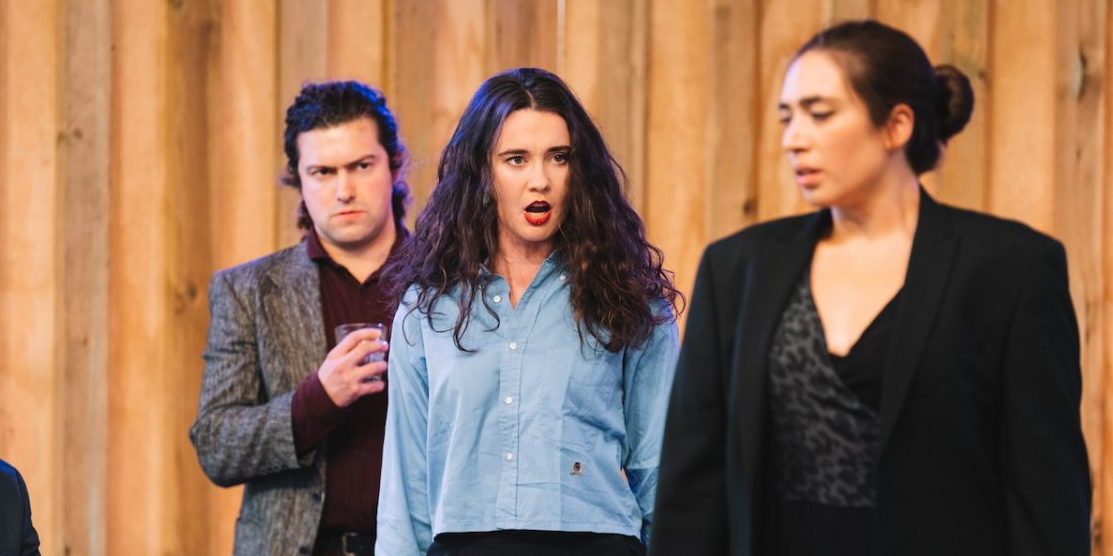As part of the splendid Grimeborn festival put on every summer by the Arcola, Marcio da Silva’s Ensemble Orquestra has brought us an intriguing and inventive version of Handel’s late opera about the enchantress Alcina. Originally devised in 1735 for the new theatre in Covent Garden, it was an opera that incorporated plenty of opportunities for crowd-pleasing dance interludes and for big scenic effects as Handel struggled to outshine a competing opera company that had “stolen” the lease to his old theatre in the Haymarket. It has a fantastical plot that seems to have little to say about the world today but in Da Silva’s version set in a modern tech-savvy company, there are some disturbing links to current social anxieties.
Bradamante, in disguise as Ricciardo, goes to Alcina’s “island” to rescue her lover Ruggiero from the manipulative and lascivious enchantress (CEO of the company). There Alcina and her equally wicked sister Morgana have lured many heroes and, after abusing them, have turned them into wild beasts – in this setting perhaps, poached them from other companies, exploited their knowledge and skills, then consigned them to dead-end jobs. The disguised newcomer excites the lust of Morgana who speedily “forgets” her lover Oronte, the company’s security chief. Bradamante, in order to set Ruggiero free, has to play along with the ‘management’ of the company. The opera then runs through a series of plots and misunderstandings until Bradamante finally restores Ruggiero to his right senses and together they vanquish Alcina and Morgana.
The Arcola has constructed an outdoor performance area in view of pandemic worries – it is a lopsided big top with a performance area in one corner. It is a worthy but not altogether successful venture – I found the extraneous noise of traffic, aircraft and passers-by very distracting. It also seemed very difficult at first for the performers to get volume and, in some cases, pitch quite right. The stage has little other than desks and computers for scenery but with striking lighting effects, this was perfectly adequate for this production. The costumes were business suits except for the wicked sisters who shone in colourful pantsuits.
As for Alcina, Helen May was commanding and alluring in equal measure with a big soprano voice that filled the tent. As Morgana, Kathleen Nic Dhiarmada was just as convincing as she gave vent to her feelings for Ricciardo. Ruggiero, a victim of Alcina’s magic, was sung by Laura Fleur. In her early scenes the need to portray the zombie-like state that the enchantress had reduced her to, left her performance rather too restrained but once freed from the spell she brought the character vividly to life, though I did wonder what difference a countertenor in the role (originally written for a castrato) would have made. Maya Wheeler-Colwell was a fine Bradamante, navigating the disguise, and her doubts about Ruggiero’s loyalty, with dramatic and musical panache. Special honourable mention though for tenor Kieran White and soprano Poppy Shotts who both shone in small roles – Shotts sang her last act aria “Barbara! Io ben lo so” with the outstanding beauty of tone.
As ever Marcio Da Silva and his band of expert baroque instrumentalists provide a realisation of Handel’s score which quickly convinces ears used to modern orchestral sounds that this nearly 300-year-old music is bang up to date. And Da Silva’s programme notes – this time available only online – are once again better than anything that the Royal Opera offers. The references to “Me Too” and “The Devil Wears Prada” don’t quite convince me but there is no doubting the dramatic effectiveness of what we see on the Arcola stage. In the original staging in 1735, when Alcina’s magical powers are removed, her palace crumbles and sinks beneath the waves. One hopes that one-day Ensemble Orquestra has the chance to go for a spectacular staging of this sort. Until then we should applaud and appreciate both the outstanding creativity and the musical authenticity of Marcio Da Silva’s invaluable company.

